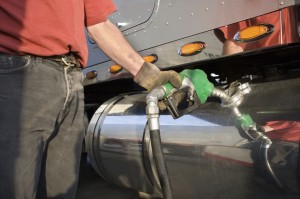How gas prices are hurting the trucking industry
 Gasoline prices around the country have skyrocketed in the last months. At its highest, the average price of regular-grade gasoline shot up nearly 80 cents to a record-setting $4.43 per gallon.
Gasoline prices around the country have skyrocketed in the last months. At its highest, the average price of regular-grade gasoline shot up nearly 80 cents to a record-setting $4.43 per gallon.
This price increase has affected people across the country, but it’s hitting the trucking industry especially hard. For trucks with diesel engines, the gas price increase is even more pronounced, with prices increasing by $1.18 to $5.20 a gallon in recent weeks. This has significantly cut into trucking companies’ and independent drivers’ profits. This has presented more challenges to the industry, which has seen huge shortages in staff recently.
Thankfully, fuel prices have dropped in recent weeks. Today, the national average for a gallon of gas is just over $4.00, down by almost 33 cents from the last weeks. However, these costs are still above the average prices seen in recent years.
While it might seem easy to feel helpless regarding these prices, arming yourself with the knowledge of why prices are changing can help you prepare for the upcoming season. Here’s why prices have been shifting:
Russia/Ukraine conflict
Russia is the second-largest oil-producing country globally. The U.S. gets about 3% of its oil from Russia. The country exports $400 million worth of oil each day. The U.S. and other allies have already imposed sanctions on Russia’s military, shipping and space program. Some of the most extensive sanctions target Russia’s banks. The hope is that this will negatively impact Russia’s economy and make it harder to do business.
So far, the stock market in Russia has tanked by a third in just one day. However, Russia has made several moves to shield itself from global actions. These include actions like stockpiling gold and aligning with China.
However, Russia’s most significant shield from this sanction is its energy sector. However, no sanctions have been imposed on Russia’s oil because of the global dependence on Russia’s production. Some reports believe that even without oil sanctions, inflation could rise in the country, ultimately affecting their economic stability while using their oil.
Global oil prices are also very sensitive to any supply disruptions. Even without sanctions, experts fear the conflict between Russia and Ukraine could hamper oil supplies in the region and drive up prices and limit Russian-supplied oil.
COVID
The COVID pandemic has also affected gas prices. When the pandemic began in 2020, the demand for petroleum products like gasoline plummeted. Most Americans were no longer going to work, participating in normal activities or even going to the store. This meant far less car traffic. Like in basic supply and demand economics, as demand lowered during this time, the supply increased.
Since the economy has largely resumed, demand has increased. This had helped oil prices partially recover but has not fully restored the supply and demand balance seen before the pandemic.
Here’s why they’re falling:
Recently, President Biden has made several decisions that have helped lower the cost of gas. At the end of March, the administration opted to release 180 million barrels of oil from the country’s reserves. These will enter the market over the next six months and will increase the supply of oil available to consumers and lessen the United States’ dependence on Russian oil.
This summer, Biden will allow the temporary addition of E15 gasoline to be added to the fuel supply. E15 is lower in cost to consumers because it contains ethanol from corn. The sale of E15 has been banned between June and September in recent years because ethanol can cause more smog, especially when temperatures are warm. This temporary measure, too, will increase the supply of oil available to consumers.
It’s difficult to say exactly what fuel prices will look like soon. These other potential initiatives should hopefully continue to lower prices for consumers. Some states are looking at fuel reimbursement programs and several trucking companies have begun looking at higher wages for drivers and other ways to improve profits and recruit staff.






